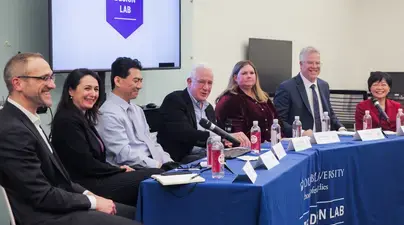When Teresa Chan began her career, insurance products and services were largely dictated by the insurance companies themselves. The assumption: insurance companies knew best what clients wanted. But as Chan moved into specialized areas such as product development and renewable and alternative energy, she witnessed a shift that continues to shape and, in some ways, disrupt the industry: the all-powerful “voice of the customer.”
“The insurance companies [of today] are much more open to talking to the clients about what they want as opposed to telling them what they want,” Chan shared with attendees of Tuesday evening’s insurance careers panel at the Career Design Lab. The panel collectively represented a range of disciplines, including underwriting, data science, actuarial science, brokerage, and law; they included Ken Radigan, CEO of PRMIA, Rita Fuller, Data Scientist at New York Life, Chris Kuo, Ph.D., Data Scientist at The Hartford, Michele Martincich, EVP at USG Insurance Services, and Michael Regier, Insurance Analytics Director at Verisk.

They agreed that insurance businesses need to deeply understand and deliver bespoke services to clients, rely on data analysis as a core business function, and integrate digital technologies and/ or collaborate with disruptors in order to take advantage of the changes that are transforming the industry. Another imperative within the industry? Attracting and retaining a new generation of talent.
They’re right, according to executives surveyed in a new market report from Ernst & Young. Attracting the right mix of talent persists as a challenge across companies, with many competing with higher-profile, consumer-driven technology companies for the next wave of forward-thinking professionals. Changing perceptions of insurance as a profession is one of the main objectives of the event and the new Insurance Management master’s program itself, which will welcome its first class in the Fall 2020 term.
“You can choose a role that suits your personality -- whether it be more analytical or more social,” said Michele Martincich. Rita Fuller, the Head of Data Science Development at New York Life, reinforced Martincich, recalling why, despite her initial plans, she stuck with insurance for nearly 20 years, “I stayed because it’s extremely interesting… Every time you get a new set of data, it’s exciting. It’s almost like getting a new job.”
The availability of massive amounts of data continues to present opportunities for businesses to make smarter decisions and edge out the competition and for professionals to carve a niche career pathway in insurance. Experts predict that, as of this year, 1.7 megabytes of data are being generated each second of every day for every person, availing potential to shift business strategies. That -- along with an estimated 50% of the insurance workforce expected to retire in 10 to 15 years -- is driving the demand for professionals who infuse technical knowledge into their work. In fact, despite early indicators of an economic slowdown, the insurance industry is growing its hiring, according to the National Association for Business Economics (NABE).
“The insurance industry is the only one where we don’t know the costs before we sell it [policies]. We have to predict it through data,” said Chris Kuo, Ph.D. “The field of data science maybe 20 years ago wasn’t as prevalent as it is now. Now, we’re embedded in all areas of the company. We’re growing as a discipline… and being seen more as a need,” added Fuller.
Applied Analytics lecturer David Kreutter, Ph.D., who served as the moderator, also pressed the panelists on how the profession is reacting to direct-to-consumer startups that are automating processes, cutting overhead, and delivering quick and convenient services.
There’s no silver bullet solution, they conceded. “With AI, computers can do more than our brains can process. We have to understand that. So how do we rely on these systems now where we really don’t understand how it goes from A to B?” said Ken Radigan, who will lecture for the Insurance Management master’s program. But, he added, “The business still very much requires the human element.”
Regardless of one’s specialty in insurance, everyone also agreed that there are some universal skills that will still be needed: communication, trustworthiness, collaboration, curiosity and, of course, adaptability.
“The advent of the insurtech companies is an opportunity for you, if you have an idea, to create something to work with the insurance companies. I think the so-called fear of AI is good because it pushes efficiency and it actually gives those of you who are entering the industry an opportunity to do something that’s new and exciting,” said Chan.
March 15, 2020 is the priority deadline to submit an application for the Insurance Management master’s degree. Learn more about the 16-month online program here.


